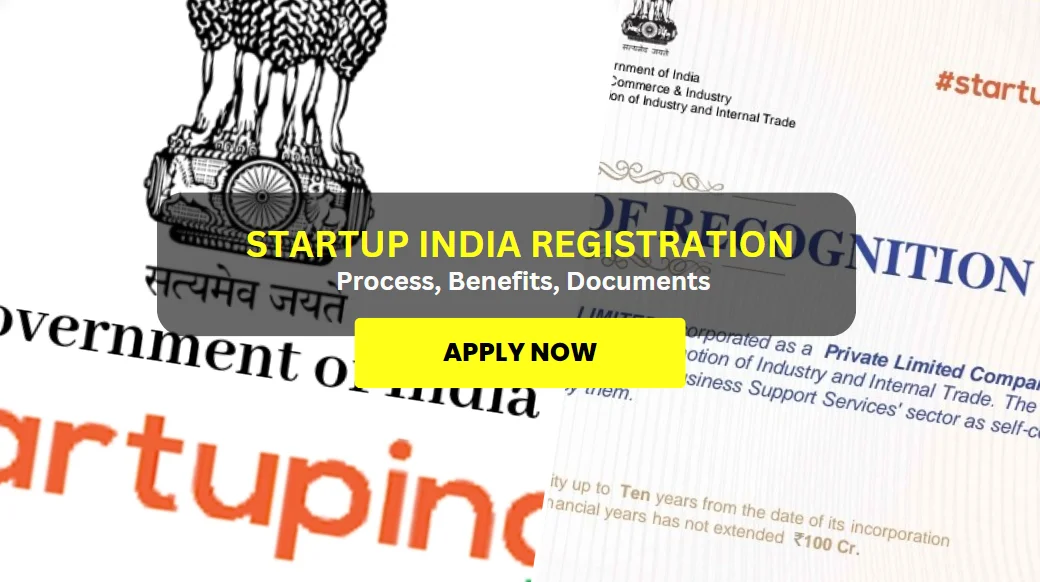Startup India is Government of India initiative that aims to create an efficient system for nurturing innovation and entrepreneurs in the country in order to drive long-term economic growth and provide large-scale job opportunities. The government wants to encourage startups to develop through innovation and design through this initiative.
Startup India
India’s startup sector is growing. The government also helps young entrepreneurs start businesses. Startups support the growth of the country’s economy. A startup is a business that provides new products or services that solve a problem that society faces. A startup may also rework an existing product or service to make it better.
Starting a business is an exciting journey, and the Startup India scheme in India has given entrepreneurial adventures a new dimension. The Startup India Registration Certificate, which confirms to a company’s innovative and prospective identity, is an important aspect of this venture.
The Indian government, under the leadership of Prime Minister Narendra Modi, launched and promoted the Startup India scheme in order to strengthen the Indian economy, recognize and encourage companies, and bring in excellent entrepreneurs, innovators, businessmen and founders.
The Startup India Movement’s goals are described below. The action plan includes the following elements:
- Improved infrastructure, including establishments for incubators.
- Facilitation of intellectual property rights, including simpler patent filing.
- Better regulatory environment, including tax savings, simpler compliance, enhanced company formation, quickest process, and more.
- Increasing financing opportunities is an aim.
- Provide a large networking database for entrepreneurs and other startup ecosystem players.
What is the Startup India Registration?
Startup India Registration is the DPIIT’s (Department of Promotion of Industry and Internal Trade) registration of startups. This identification enables Startups to take use of the Government’s flagship Startup India Scheme. The Startup India Scheme, which was launched in January 2016, intends to build a strong environment for developing companies and their creative products. The goal is to achieve the long-term goals of job creation and financially growth in the country.
Key Features of Startup India Registration
Startups play a pivotal role in driving innovation and economic growth, and the Startup India Registration Certificate is a testament to the government’s commitment to fostering this entrepreneurial spirit. Let’s delve into the key features that make this registration process a game-changer for budding businesses:
1. Eligibility Criteria Clarity
The startup registration process begins with clear and defined eligibility criteria. This transparency ensures that businesses fitting the criteria can confidently pursue registration, bringing clarity to the application process.
2. Simplified Application Process
The Startup India initiative strives to make the registration process user-friendly. The application procedure is designed to be straightforward, with step-by-step guidelines, minimizing the bureaucratic hurdles that startups often face.
3. Documentation Streamlining
To ease the burden on startups, the required documentation is streamlined. This ensures that the necessary paperwork is concise and relevant, allowing businesses to focus on their operations rather than drowning in paperwork.
4. Government Scheme Access
One of the standout features of Startup India Registration is the access it grants to various government schemes and incentives. Registered startups can tap into resources and support that can significantly boost their growth trajectory.
5. Tax Benefits for Registered Startups
Tax incentives are a significant lure for startups considering registration. The certificate opens doors to a range of tax benefits, including exemptions and deductions, providing financial relief during the crucial early stages of business.
6. Credibility and Recognition
The Startup India Registration Certificate is not just a legal document; it is a badge of credibility. Registered startups gain recognition in the market, instilling confidence in investors, customers, and partners.
7. Networking Opportunities
The initiative fosters a sense of community among registered startups. Networking events, mentorship programs, and collaborative platforms provide opportunities for startups to connect, learn, and grow together.
8. Incentives for Research and Development
Recognizing the importance of innovation, the registration certificate incentivizes research and development activities. This encourages startups to invest in groundbreaking ideas and contribute to technological advancements.
9. Faster Winding Up Process
In the unpredictable world of startups, not all ventures succeed. The registration process acknowledges this reality and offers a faster winding-up process for startups that need to cease operations, allowing for a more agile approach.
10. Global Recognition
Startup India Registration extends its benefits beyond national borders. Registered startups gain global recognition, opening doors to international collaborations, partnerships, and funding opportunities.
11. Support for Women Entrepreneurs
Inclusivity is a key focus of the initiative, with special provisions and support for women entrepreneurs. The registration process actively encourages and facilitates the participation of women in the startup ecosystem.
12. Transparent Monitoring and Reporting
The initiative incorporates transparent monitoring and reporting mechanisms. This ensures accountability and allows startups to track their progress in fulfilling the obligations associated with the registration.
13. Online Application and Tracking
Embracing the digital age, the Startup India Registration process is predominantly online. This not only saves time but also provides startups with the convenience of tracking their application status in real-time.
14. Flexibility in Business Structure
Startups come in various shapes and sizes, and the registration process accommodates this diversity. It allows flexibility in the business structure, catering to the unique needs and goals of different startups.
15. Continuous Government Support
Beyond the initial registration, the government continues to support registered startups. Regular updates, communication channels, and periodic reviews ensure that startups stay informed and connected with the evolving entrepreneurial landscape.
The key features of Startup India Registration go beyond legalities; they form a comprehensive support system that empowers startups to thrive, innovate, and contribute meaningfully to the economy. The initiative not only provides a launchpad for startups but also propels them towards sustainable success.
Startup India Registration Eligibility
Startup India, a government initiative aimed at fostering innovation and entrepreneurship, has defined specific eligibility criteria for businesses seeking recognition. To qualify for Startup India Registration, a business must meet the following criteria:
Type of Entity:
The organization to be registered must be a private limited company or a limited liability partnership.
Period of Existence:
The enterprise should not have completed a period of ten years from the date of its incorporation or registration.
Annual Turnover Limit:
The enterprise must not have had a turnover exceeding Rs. 100 crore annually for any of the financial years since its incorporation.
Objective and Focus:
The primary objective of the business should be the development, innovation, or improvement of services or processes with the purpose of generating employment or creating wealth.
Origination of Entity:
The startup must not have been formed by reconstructing or splitting up any business that is already in existence.
Approval from DIPP:
The organization should have obtained approval from the Department of Industrial Policy and Promotion (DIPP).
Support from Funding Entities:
To gain approval from DIPP, the firm must be supported by an incubation fund, angel fund, or private equity fund.
Supporter Guarantee:
The firm should have obtained a supporter guarantee from the Indian Patent and Trademark Office.
Incubation Proposal:
It must have a proposal letter from an incubation facility.
Tax Benefits:
Capital increase is excluded from income tax under the Startup India scheme.
Innovative Ideas, Products, or Services:
The firm should demonstrate innovative ideas, products, or services.
SEBI Registration for Funding Entities:
Angel funds, incubation funds, accelerators, private equity funds, and angel networks supporting the startup should be registered under SEBI (Securities and Exchange Board of India).
Meeting these eligibility criteria is crucial for startups aspiring to register under Startup India. These criteria ensure that recognized startups align with the initiative’s goals of promoting innovation, economic growth, and employment opportunities.




